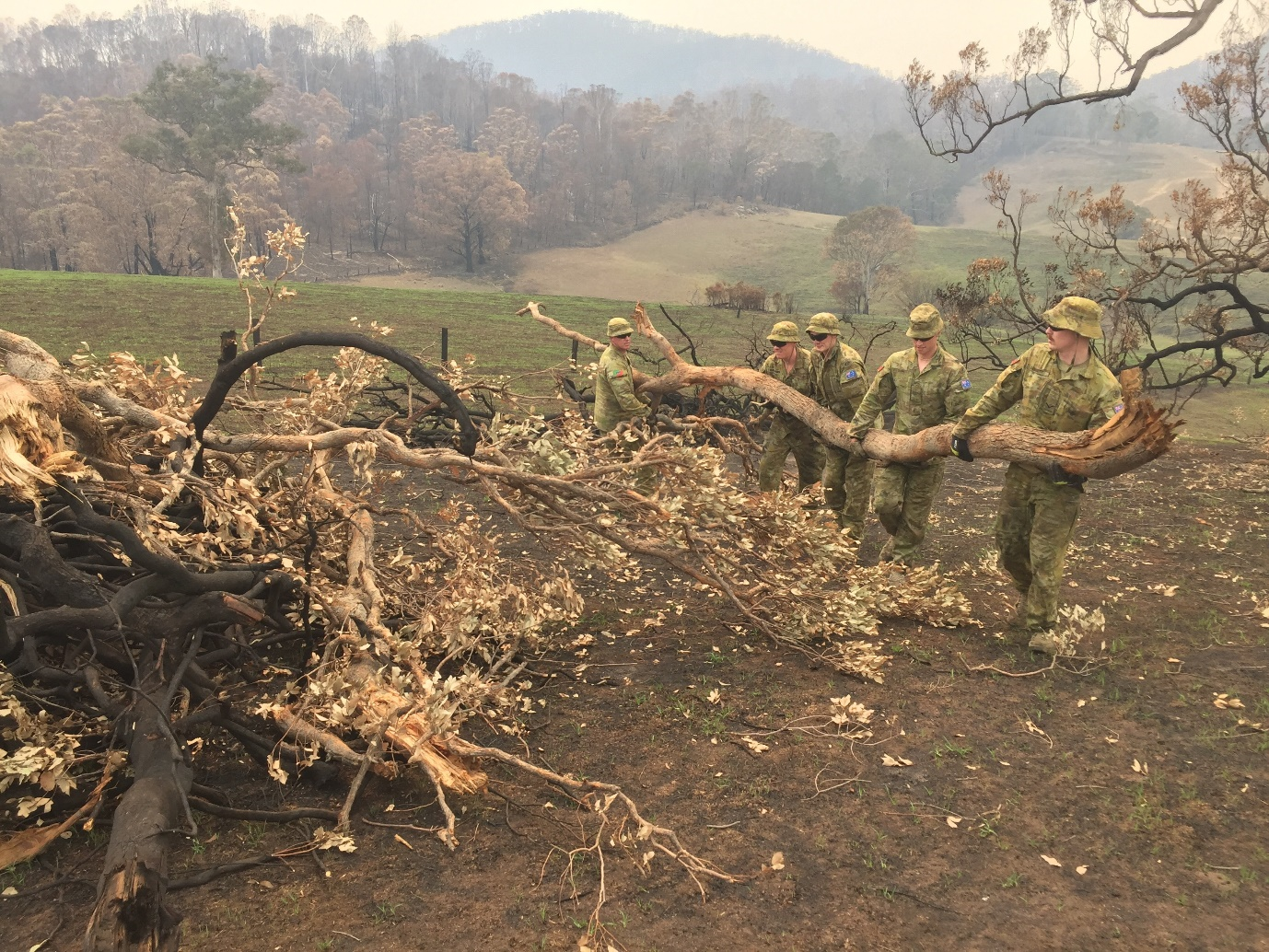Our Marketing Manager provides an update from the fire line in Southern NSW

Clearing damaged and burnt trees from Quaama school
Approximately 3,000 reservists, myself included, have been deployed since the 4th of January 2020, in response to the devastating bushfires across country.
I won’t get into the politics surrounding this crisis because as a Defence Force, our job is to support the government of the day and work impartially to defend Australia and its interests.
The military callout of Reservists was unprecedented. Never before have these callout powers been invoked, and never has the Army Reserve been used on such a large scale in response to a natural disaster in Australia. Let me clarify that while majority of those men and women working in fire affected communities are reservists, there is also a large contingent of Regular Army personnel and assets in support. This is a whole of Army response, and close to 1,000 full-time members of the military have been recalled from their annual Christmas leave to support the Bushfire response.
As an Army reservist, a deployment like this is the ultimate way for us to serve our country – that is deploying to assist our fellow Australians. I’ve now been deployed since the beginning of Jan, and I’d like to share with you the kinds of tasks that are being conducted by Reservists right now.
I’ll start by saying that you need to understand that the Military is here in support of Emergency Services. This means that we are guided by them with regards to how and where support is most needed. We are not here to do the job of the State Emergency Service, or the Rural Fire Service. We are working with all levels of Government, including local councils to provide support where it is needed. Liaising with local government, emergency services, and aid organisations, we’ve worked to fill the gaps in helping stabilise the situation for fire affected communities.

My team walking up a hill to start assisting a farmer with his fences
I’ve been leading one of our strike teams. A mix of Infantrymen who provide the bulk of the manpower, mixed with a strong engineer capability who can assess and provide specialist skills to allow our team to complete a very broad range of tasks.
So far, this has included:
- Clearing debris from paddocks of severely affected farmers in the Cobargo region, to allow them to re-sow crops to feed animals and maintain their livelihood.
- Clearing roads and tracks of fallen trees and debris to allow traffic to safely get through.
- Providing temporary repairs to fencing to prevent cattle from being able to walk onto the highways
- Identifying jobs and tasks that are needed and other services may be able to provide and passing them through to the State Emergency Operations Centre for their awareness and allocation
- Providing potable water to people that are short
- Setting up and assisting with the running of distribution centres to get supplies to communities that need them
- Liaising with remote communities who are still isolated to determine their needs and identify the opportunity to assist them
- Assisting with bulk burial of animal carcasses where required to help with disease control
It is very satisfying work.

A military tractor is deployed in support of a fencing task my team were completing
In many remote communities, people rely on the land for their income and many of these areas have been devastated by fire. Fences no longer exist, crops have been burned, houses, sheds, and equipment destroyed. In many places, electricity is out and they are running on generators, or have no power at all.

Just one of the properties that was destroyed in the fire, West of Bodalla, NSW.
It is going to take a long time for many of these areas to fully recover, and the Army isn’t going to fix this ourselves, but we have well-trained, fit, and highly motivated workforce that can get in and lend a hand. Most importantly, we are giving people hope – reminding them that in their time of need, their government and their country hasn’t forgotten about them.
In the last few days I was responsible for a task at a farmer’s property, which had been devastated by fire, including the loss of cattle, and human life. I had 26 people on the ground for the best part of 2 days to assist him clearing his property. We helped clear the road on his property of debris, including fallen and dangerous trees, as well as cleared debris from his paddocks, which will allow him to re-seed the land to grow crops which will allow him to feed his remaining cows, and support their population recovery.

Members of my team clear a paddock of debris, to allow a farmer to commence sowing seed to provide food for his surviving dairy cattle.
Did we fix things for him? No – it will take a very long time for farmers to recover from this. But, if you think about it, our contribution was significant. In 2 days, 26 people did the equivalent work of what he and his two offsiders could have done in a month (416 man hours of work). And considering they have a working dairy farm and spend hours every day milking the cows, the work we did would have taken them much longer.
Just t a few days assistance has helped relieve this farmer of an additional burden and barrier to him being able to move forward and recover from this devastation.

The team preparing chainsaws
Today, we helped another farmer who had lost his house. He was hit by a falling tree last year, and is still recovering from his injuries, and now his home is gone. We helped him tidy up, removing burnt trees from around his shed, clearing gutters, and reducing the fuel load around what structures are still standing. . They are in desperate need of water to have any chance at recovering, so the Army will be sending over a bulk water tanker and a few people to help him water his surviving olive trees, and thus try to save what remains of his livelihood.

This farmer lost his house in the blaze, but his shed (not in the photo) survived. We helped to clear trees and debris from around the shed to prevent it being lost if the fire came back through

Chainsaw qualified members of my team clear trees from around the shed on the previously mentioned property
On another task, we cut through fences and cleared a path for an elderly man and his wife, who were living in tents. This allowed them to bring a Caravan onto their property, which will become their permanent home for the foreseeable future.
In another job, following a day of fierce fires in the Bodalla area, we went out and assisted the local council clearing roads to ensure that residents could access their properties, or leave if threatened by fire again in the future. At one point, my strike team cleared the path to a burned out house so Police could attend and conduct a search.
Another day, we helped an Arborist who lost everything in the fire, except his equipment. He had spent the previous 2 weeks volunteering, helping others clear their properties, and now returned home to deal with his own property. We made a massive difference, just getting things tidied up so he can start to rebuild.

members of my team helping tidy up at the property of an Arborist who was finally returning home after several weeks volunteering to help others clear their own properties.
The Army is making a meaningful contribution to the recovery efforts that the government and its Emergency Management and Response organisations are undertaking. I feel privileged to have the opportunity to help in a small but meaningful and personal way in a time of need.

A burned out tractor on a farmers property near Cobargo.

The farmer had a second tractor, which he used to fight the fire. It got so badly damaged by the fire that he needed to take parts off the burnt out tractor to try to make the one that survived operational again
In saying that, I’m in awe of the real heroes of this event – the volunteers. The people who have selflessly provided support to their people. I’m talking about everyone that has given their time for nothing in return – RFS volunteers, religious organisations, community groups and the like that recognised the need and helped, asking for nothing in return. While the devastation and scale of this is horrendous, the actions of these people demonstrate the Aussie spirit is alive and well, and renew my faith in the good that still exists out there. If you have helped in anyway, on behalf of some very grateful people, I say thank you.


